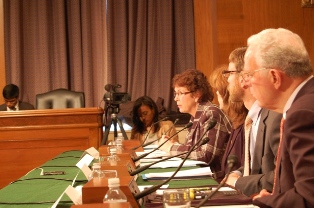
2-6-13 Feature Story:
Tess Stack Kuenning, the Executive Director of the Bi-State Primary Care Association (serving New Hampshire and Vermont) this week testified before the Senate Subcommittee on Primary Health and Aging. The hearing focused on the primary care needs of the 30 million new patients that will gain access to insurance under the Affordable Care Act (ACA).
Kuenning, who is also a Registered Nurse (RN) by training, was part of a panel of health care experts from across the country who answered questions posed by the 14-member subcommittee of the U.S. Senate Committee on Health, Education, Labor and Pensions. In her opening testimony, Kuenning noted the critical role that Community Health Centers will play as ACA implementation moves forward and more people will gain access to insurance coverage.
"In my view, any efforts to increase access to insurance must also include investments to grow and expand the primary care safety net infrastructure. Primary and preventive care must be central to any efforts to achieve its goals of increasing access, managing total patient costs and producing quality patient outcomes. As this Committee is aware, the ACA created significant federal investments in expanding public coverage and private insurance reforms. However, coverage does not equate to access. It is access that makes coverage real. We need sustainable solutions to increase our primary care capacity, lower and manage our health care costs and assure quality outcomes, patient satisfaction and patient accountability," she said.
Kuenning underscored to lawmakers that the continued expansion of Community Health Centers (which has allowed them to reach over 22 million medically underserved people) was critical to meeting the demand for care, but said that the current fiscal climate posed a challenge and has slowed the pace of growth, despite the ACA's significant investment. Of particular concern is that a recent guidance issued by the Health Resources and Services Administration (HRSA) on applications for grant funds for new health centers, or "New Access Points" (NAPs) does not utilize the full $300 million in funding available under the Health Center Trust Fund under the Affordable Care Act for FY2013. Instead, the guidance solicits applications to award a smaller pot of funds to support only 25 NAP awards, and proposes holding back $281 million. Ultimately, this move will hinder efforts for health centers to meet the expected demand for care.
She said, "We strongly support the President's proposed funding level of $3.1 billion for Community Health Centers, but we are concerned about the Administration's proposal to hold back $280 million of the total proposed increase of $300 million and instead spread out health center growth over a longer period of time. HRSA's January 16, 2013 solicitation for New Access Point grants will only expend $20 million of the $300 million in available funding under the ACA to establish 25 new Community Health Centers and only expand care to 60,000 new patients. Instead of holding back funding, we propose that the entire increase be used immediately to provide for the expansion of care to 2.5 million new patients. This planned minor expansion will fall far short of addressing the pressing need for primary care services that has clearly been demonstrated in communities nationally and will not provide the access to primary care that was promised in the ACA. Next year, when several critical provisions of the ACA begin, we should do all we can to assure we have a strong, stable and growing primary care infrastructure."
With 60 million people without access to primary care, Kuenning called on lawmakers to leverage "the funds available under the ACA to expand the number of Community Health Centers throughout the country to ensure we are able address the nation's primary care shortage." (source: National Association of Community Health Centers)












